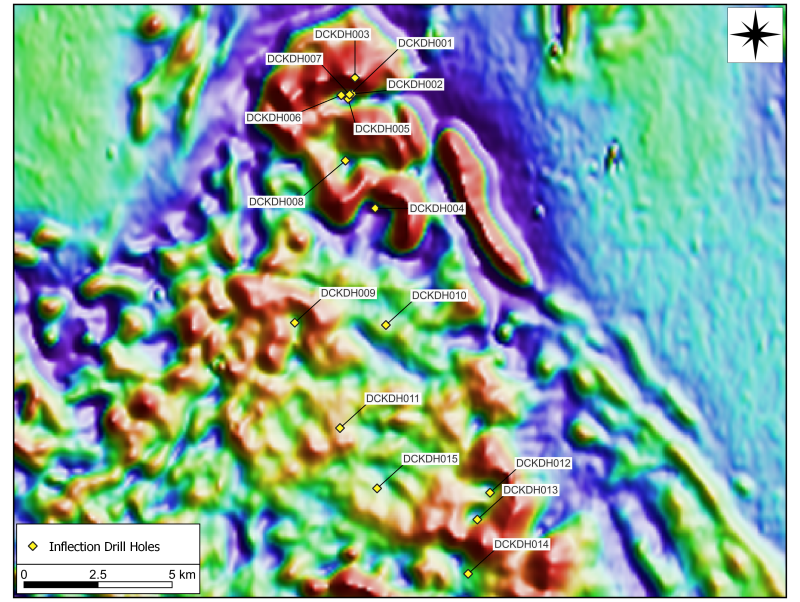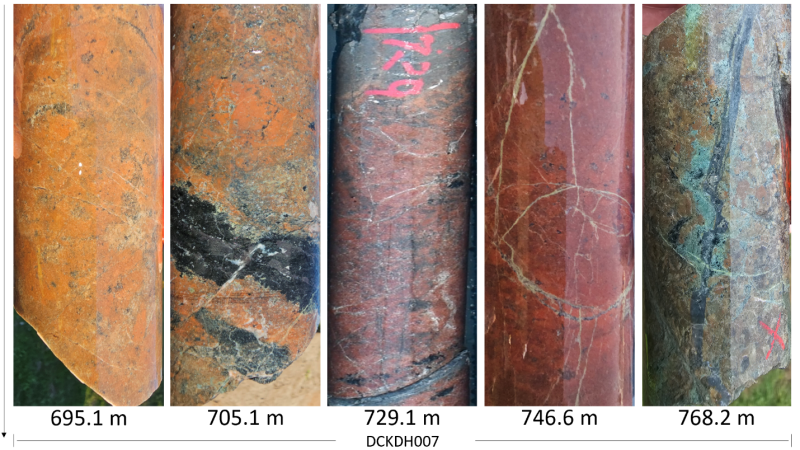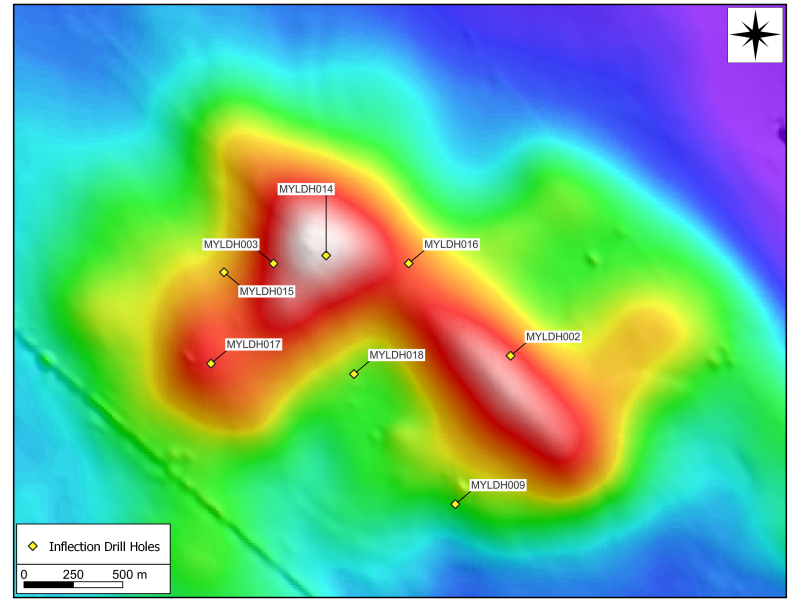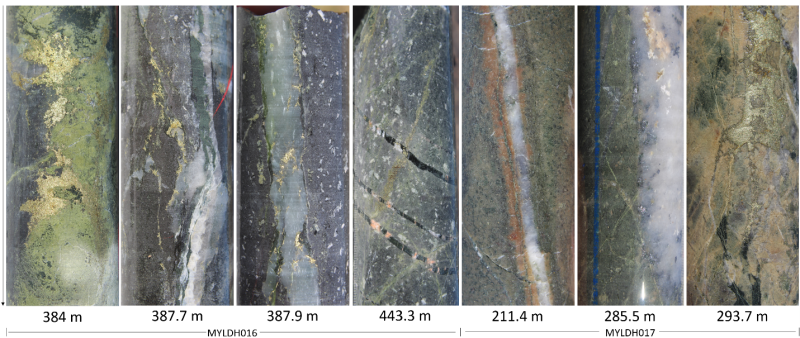Inflection Resources Provides an Update on Drilling and Geophysical Surveys in New South Wales
Vancouver, British Columbia – TheNewswire – October 11, 2023: Inflection Resources Ltd. (CSE:AUCU) (OTC:AUCUF) (FSE:5VJ) (the “Company” or “Inflection”) is pleased to provide an update on its ongoing exploration programs in New South Wales, Australia conducted under an Exploration Agreement with AngloGold Ashanti Australia Limited (“AngloGold”) announced on June 14, 2023.
Summary Highlights:
- Initial drilling has focused on two principal target areas, Duck Creek and Myallmundi where earlier drilling by the Company intercepted favourable alteration indicative of being in proximity to a possible porphyry system;
- 6,845 metres of drilling comprising fourteen holes has now been completed using two combination mud rotary/diamond drill rigs. All assays are pending from the laboratory;
- One deep drill hole has been completed on the northern sector of the Duck Creek exploration license. Hole DCKDH007 intersected biotite-magnetite ± K-feldspar altered andesitic volcanic rocks cut by minor quartz-magnetite and porphyry-style B veins indicative of a porphyry-proximal outer potassic environment. The alteration suggests this hole vectored to a more distal area of the potential mineralised porphyry. To improve targeting, geophysical surveys are underway over this specific area prior to drilling the next phase of deeper drill holes;
- Two separate geophysical surveys are currently underway on the northern Duck Creek exploration license including Ambient Noise Tomography (ANT) and an Induced Polarisation/Magnetotellurics (IP/MT) survey. Both surveys are expected to be completed shortly. A third survey, a ground gravity study, was just completed by the Company; and,
- Four follow-up drill holes completed on the Myallmundi target intersected chalcopyrite and molybdenite bearing quartz veins which locally exhibit K-feldspar selvages along with early biotite-magnetite-epidote alteration indicative of being in the porphyry proximal environment. The occurrence of chalcopyrite and molybdenite bearing quartz veins have been reported on the margins of mineralised porphyry copper deposits in the Macquarie Arc including Newcrest’s Cadia East mine.
Alistair Waddell, Inflection’s President and CEO, states: “We are pleased with the initial progress of the resumed drill program in New South Wales. Initial deep drilling on our northern Duck Creek target area has provided guidance in terms of a vector towards a potential porphyry centre and when combined with the soon to be completed geophysical surveys should greatly assist the positioning of additional deep holes. We are also highly encouraged by the Myallmundi target which has returned the most significant copper sulphide and molybdenite mineralisation since the Company started drilling in Australia. These wide spaced drill holes, which extend over an approximate distance of ~1,400 metres, exhibit alteration indicative of a porphyry-proximal environment which will be followed up with additional drilling once all assays from this phase have been received.”
Duck Creek – Drill Update:
The Company considers the Duck Creek exploration license to be highly prospective for large-scale alkalic porphyry-related copper-gold style targets comprising favourable magnetic and gravity features which are interpreted to be part of the prospective Macquarie Arc volcanic sequence. Nine additional drill holes (DCKDH007-015) totalling 4,632 m have recently been completed on the Duck Creek exploration license (Figure 1).
Figure 1: Duck Creek drill hole location map with showing aeromagnetic data (reduced-to-pole) as background.
Drill hole DCKDH007 was drilled to a depth of 819 metres on the northern target where previous Inflection drilling intersected strongly hydrothermally altered rocks with characteristics similar to those often found adjacent to mineralised alkalic copper–gold systems such as Newcrest’s Cadia mine and the Northparkes mine complex. Previous Inflection drill holes DCKDH002, 005 and 006 intercepted porphyry-style alteration over an approximate 400 by 250 metre area which included biotite-albite-K-feldspar-tourmaline and blebs of bornite. The principal target area of interest is associated with an 800 by 1,300 metre aeromagnetic low feature interpreted to represent magnetite destruction associated with hydrothermal alteration. DCKDH007 was an angle hole drilled with a 115° azimuth and -70° dip which intersected biotite-magnetite ± K-feldspar altered andesitic volcanoclastic conglomerate cut by minor quartz-magnetite and porphyry-style B veins (Figure 2). This hydrothermal alteration and vein style are indicative of a porphyry-proximal outer potassic environment and suggests being more distal from a potential mineralised porphyry relative to the earlier holes. The decision was taken, in conjunction with AngloGold, to complete three different geophysical surveys over this specific area prior to the next phase of deeper drill holes. These surveys are almost complete and drilling in this specific area is expected to recommence once all the processed data has been received and interpreted in late October, 2023.
Figure 2: Select Duck Creek diamond drill core – Hole DCKDH007 – 695.1m, K-feldspar flooded andesite conglomerate, 705.1m, Massive magnetite vein in K-feldspar altered andesite conglomerate, 729.1m, Strong K-feldspar with biotite-magnetite altered andesite conglomerate, 746.6m Strong K-feldspar altered andesite conglomerate, 768.2m Quartz-pyrite vein in hematite-sericite altered andesitic volcanics.
Eight additional scout holes (DCKDH008-015) were drilled elsewhere on the Duck Creek license, testing new previously undrilled geophysical targets with distances ranging from 2 to 16 kilometres south from DCKDH007. All holes intersected mixed andesitic volcanic rocks with regional propylitic alteration and no material mineralisation. Sample assays have yet to be received for these holes although no copper or gold values of significance are expected.
Myallmundi – Drill Update:
The Company has completed five additional drill holes (MYLDH014-018) totalling 2,214 metres on the Myallmundi target, testing an approximate 1.5 by 2.0-kilometre zone of magnetite enrichment evident in aeromagnetic data (Figure 3). The drill program was designed to step out from porphyry-style quartz-chalcopyrite-molybdenite bearing veins intersected in first-pass drill hole MYLDH003.
Four of these drill holes (MYLDH014, MYLDH015, MYLDH016 and MYLDH017) which extend over an approximate distance of ~1,400 metres intersected chalcopyrite and molybdenite bearing quartz veins that locally exhibit K-feldspar selvages and are suggestive of a porphyry-proximal environment (Figure 4). The occurrence of chalcopyrite and molybdenite bearing quartz veins have been reported on the margins of mineralised porphyry copper-gold deposits such as Newcrest’s Cadia East Mine. Additionally, these drill holes exhibit early biotite-magnetite-epidote ± K-feldspar alteration, also indicative of a porphyry-proximal environment, which has been overprinted by silica-sericite alteration.
Figure 3: Myallmundi drill hole location map with showing aeromagnetic data (reduced-to-pole) as background.
Figure 4: Select Myallmundi diamond drill core – Hole MYLDH016 – 384.0m: Quartz-epidote-chalcopyrite vein cutting magnetite-epidote altered feldspar porphyritic andesite; 387.7m: Quartz-chalcopyrite-magnetite vein which cuts chlorite altered andesite; 387.9m: Quartz-chalcopyrite-magnetite vein which cuts chlorite altered andesite; 443.3m: Chalcopyrite veins which cut chlorite-carbonate veins in magnetite altered feldspar porphyritic andesite; Hole MYLDH017 – 211.4m: Quartz-chalcopyrite-molybdenite vein with K-feldspar selvage which cuts chlorite altered andesite; 285.5m: Quartz-molybdenite vein which cuts epidote-magnetite-chlorite altered feldspar porphyritic andesite; 293.7m: Quartz-chalcopyrite-molybdenite vein which cuts early biotite with sericite alteration overprinted feldspar porphyritic andesite.
The Company is awaiting the core sample geochemistry and additional sample data to enable accurate positioning of further drill holes into this developing priority target.
Duck Creek – Geophysical surveys:
Two separate geophysical surveys are currently underway on the Duck Creek exploration license including Ambient Noise Tomography and an Induced Polarisation/Magnetotellurics (IP/MT) survey. A third survey, a ground gravity study, has also just been completed by the Company with the final delivery of data still pending. The principal objective of the three surveys is to enable the more accurate positioning of further deep drill holes specifically on the northern Duck Creek target.
Ambient Noise Tomography (ANT) – The Company has engaged Fleet Space Technologies to complete an ANT survey. ANT is a passive seismic exploration technique that makes use of pervasive seismic noise from natural and anthropogenic sources to visualise the three-dimensional subsurface. ANT offers the advantages of covering a large area and can visualise below cover of more than 2,000 metres and can potentially indicate the depth of post-mineral cover and structures within the basement rock.
The survey is covering an area of approximately 30 km2 across the northern Duck Creek Project area where previous drilling returned encouraging results. The survey will produce an image of the paleotopographic surface allowing for detailed 3D constrained modelling of magnetic and gravity data. The aim of the survey is to map the paleosurface and basement rocks to identify areas of potential alteration or intrusions in the basement sequence for further drill testing. The survey data is expected to be finished in mid October, enabling the Company to better position deeper drill holes in the Northern Duck Creek target area.
Induced Polarisation/Magnetotellurics (IP/MT) – The Company has commissioned Fender Geophysics to complete a focused ~35-line kilometre IP/MT survey over selected aeromagnetic targets in the northern Duck Creek exploration license area. The survey is configured for acquisition of standard Pole-Dipole IP data at 200 metre dipole spacing. The purpose of this survey is to identify zones of elevated chargeability that may represent sulphides commonly associated with porphyry systems in proximity to the area where previous drilling returned encouraging results.
Gravity survey – The Company commissioned Daishsat Geodetic Surveyors to complete and infill a ground-based gravity survey to enable almost full coverage of the broader Duck Creek exploration license. The now completed survey included 1,190 stations collected on a 500 metre grid over an area depicted in the sparsely collected NSW Geological Survey data as a broad zone of low gravity. The Northparkes porphyry Cu-Au mine situated approximately 180 kilometres southeast is associated with a large gravity low indicative of a batholith and smaller porphyry intrusions at depth. The purpose of this survey is to identify similar gravity lows suggestive of porphyry intrusions within the greater Duck Creek exploration license.
AngloGold Exploration Agreement Terms:
All the work programs noted above form part of the AngloGold Ashanti Exploration Alliance where AngloGold is sole funding up to AUD$10,000,000 on exploration expenditures across a wide range of different intrusive related exploration targets over a maximum 36-month period, which includes a minimum expenditure commitment of AUD$6,000,000. Inflection is operating Phase I and is receiving a 10% management fee for doing so. Upon completion of Phase I, AngloGold then retains the right to designate up to five individual projects where it may potentially earn up to a 75% interest in each by completing various milestones. See Inflection news release dated June 14, 2023 for further details.
About Inflection’s NSW Projects:
The Company is systematically exploring for large copper-gold and gold deposits in the northern interpreted extension of the Macquarie Arc, part of the Lachlan Fold Belt in New South Wales. The Macquarie Arc is Australia’s premier porphyry copper-gold province host to Newcrest Mining’s Cadia deposits, the CMOC Northparkes deposits and Evolution Mining’s Cowal deposits plus numerous exploration prospects including Boda, the discovery made by Alkane Resources.
The Company uses cost-effective mud-rotary drilling to cut through unmineralised post-mineral sedimentary cover before transitioning to diamond core drilling once basement is reached. It is well documented that mineralised bodies elsewhere in the belt, in particular porphyry and intrusive related systems have large district-scale alteration and geochemical halos or footprints surrounding them. The Company completes a series of short diamond drill holes into bedrock rather than just one or two deep and more expensive diamond drill holes. Multiple data points gained from alteration and mineral geochemistry is then used to vector additional deeper holes. This is a proven exploration strategy in the covered segments of the Macquarie Arc having been directly responsible for the discovery of the Northparkes and Cowal deposits.
Qualified Person and Sampling Quality Control:
The scientific and technical information contained in this news release has been reviewed and approved by Mr. Carl Swensson (FAusIMM), a “Qualified Person” (“QP”) as defined in National Instrument 43-101 – Standards of Disclosure for Mineral Projects.
Drilling is being conducted using a truck-mounted multi-purpose drill rig. Mud rotary drilling is utilised to drill through the cover sequence before transitioning to diamond drilling using NQ sized core at the unconformity. Core is logged at the Company’s field office, photographed and marked before being cut to the Company’s specified sample intervals. Half core samples are placed in bags with internationally certified blanks and standards inserted. Samples are dispatched to ALS Laboratories in Orange NSW, an accredited analytical laboratory meeting ISO/IEC 17025:2005 and ISO 9001:2015. Samples are prepared by crushing and grinding via ALS methods CRU-21 and PUL-32 respectively. The pulps are then assayed for 48 elements via ALS method ME-MS61 using a 25g sample after a four acid near total digest with an ICP-MS finish. Gold is assayed by fire assay using ALS method Au-AA23 using a 30g sample charge and AAS finish. Laboratory standards and QA-QC are monitored by the Company. Coarse rejects from the sample preparation are subjected to spectral analysis.
About Inflection Resources Ltd. Inflection is a technically driven copper-gold and gold focused mineral exploration company listed on the Canadian Securities Exchange under the symbol “AUCU” and on the OTCQB under the symbol “AUCUF” with projects in Australia. For more information, please visit the Company website at www.inflectionresources.com.
On behalf of the Board of Directors
Alistair Waddell
President and CEO
For further information, please contact:
Brennan Zerb
Investor Relations Manager
+1 (778) 867-5016
Forward-Looking Statements: This news release includes certain forward-looking statements and forward-looking information (collectively, “forward-looking statements”) within the meaning of applicable Canadian securities legislation. All statements, other than statements of historical fact, included herein including, without limitation, statements regarding future capital expenditures, amount of drilling, receipt of the maximum amount of available grant funding, anticipated content, commencement and cost of exploration programs in respect of the Company’s projects and mineral properties, AngloGold’s anticipated funding of the Minimum Commitment and timing thereof, and the anticipated business plans and timing of future activities of the Company, are forward-looking statements. Although the Company believes that such statements are reasonable, it can give no assurance that such expectations will prove to be correct. Often, but not always, forward looking information can be identified by words such as “pro forma”, “plans”, “expects”, “may”, “should”, “budget”, “scheduled”, “estimates”, “forecasts”, “intends”, “anticipates”, “believes”, “potential” or variations of such words including negative variations thereof, and phrases that refer to certain actions, events or results that may, could, would, might or will occur or be taken or achieved. Forward-looking statements involve known and unknown risks, uncertainties and other factors which may cause the actual results, performance or achievements of the Company to differ materially from any future results, performance or achievements expressed or implied by the forward-looking statements. Such risks and other factors include, among others, statements as to the anticipated business plans and timing of future activities of the Company, including the Company’s exploration plans. the proposed expenditures for exploration work thereon, the ability of the Company to obtain sufficient financing to fund its business activities and plans, delays in obtaining governmental and regulatory approvals (including of the Canadian Securities Exchange), permits or financing, changes in laws, regulations and policies affecting mining operations, the Company’s limited operating history, currency fluctuations, title disputes or claims, environmental issues and liabilities, as well as those factors discussed under the heading “Risk Factors” in the Company’s prospectus dated June 12, 2020 and other filings of the Company with the Canadian Securities Authorities, copies of which can be found under the Company’s profile on the SEDAR website at www.sedar.com. Readers are cautioned not to place undue reliance on forward-looking statements. The Company undertakes no obligation to update any of the forward-looking statements, except as otherwise required by law.
Copyright (c) 2023 TheNewswire – All rights reserved.































